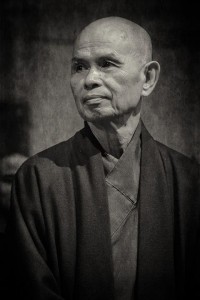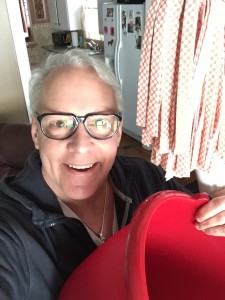Lately, Vietnamese Buddhist Monk and Zen Master, Thich Nhat Hanh, has been on my mind. As you may know, he is still in a coma. We hope and pray for his recovery.
Whenever I think of him, however, I am reminded of the beautiful story he tells in his book Living Buddha, Living Christ about the time when the Buddha was asked, “Sir, what it is you and your monks practice?”

He replied, “We sit, we walk, we eat.”
“But sir,” objected the inquirer, “everyone sits, walks, and eats.”
The Buddha explained, “When we sit, we know we are sitting. When we walk, we know we know we are walking. When we eat, we know we are eating.”
We Sit, We Walk, We Eat
Frankly, I often do not. I catch myself eating and thinking about anything but eating. I am more conscious, however, ever since that time a few years ago when I nearly choked to death on a piece of food. Fortunately, the friend I was with knew how to engage in the maneuver that saved my life.
Such an experience will make you more conscious of what’s in your mouth. But, frankly, I still find myself thinking about other things than what it is I’m doing now.
This is my spiritual practice. Staying connected to what I am doing now. This is “mindfulness” spoken of so much in the east.
Is it the same thing Jesus meant by living in the conscious awareness of the Holy Spirit?
I think so.
When Jesus spoke of the day when the Holy Spirit would come I think he was referring to the same thing the Buddha highlights in the story above.
Living mindfully is living into this present moment. Completely. Utterly. Totally. That was the point the Buddha was making – giving your consciousness or full attention to what is happening now – engage your total presence in the “here and now,” as Ram Dass loves to put it.
You think this is easy?
Only if you don’t try to do it.
Now, I’m suggesting for my Christian readers that what the Buddha advocated, Jesus did, too. In other words, the two spiritual masters were after the same essential consequence – totally connectedness to now.
Jesus framed it like this: The Holy Spirit would come to “walk beside you” – that’s the literal translation of the Greek word “parakletos” in John’s Gospel, although it is often translated in our English Bibles as “Comforter” or “Guide.” (see John 15:26-16:4).
The Holy Spirit did not come so you could speak in tongues, as some misinformed souls in Christianity have assumed. “Glossolalia,” as it is called, or the “heavenly” language enables the practitioner, not to enter now, but to escape it. Just the opposite of the Holy Spirit’s real purpose. Jesus said the Holy Spirt would come…the Comforter would appear…and walk with you. But the Spirit does not lead you out of life. He leads you into life.
The Comforter, the Holy Spirit, and Mindfulness
Isn’t this what you and I need to learn more and more?
Of course it is. I need to learn, not how to escape life, but live it and live into it. Distractions abound in every culture for those looking for a means of escaping.
Some escape through drugs.
Others escape through entertainment.
Still others use religion as a means of escaping life.
Not those, however, who truly understand what the Buddha…what Jesus was saying.
Most of your life and mine is spent “lost in the past,” as Thich Nhat Hanh puts it, “or carried away by future projects and concerns” (from Living Buddha, Living Christ, p.199).
Mindfulness is entering fully into this present moment.
Being fully in the Spirit, or aware and conscious of the Comforter’s presence with you as you journey through life, accomplishes precisely the same thing. His presence brings you into NOW!
If you will allow your mindful practices to bring you into now, you are everything you need.
If you will allow the Holy Spirit to walk with you into now, you will have everything needed for life.
Again, here west meets east. Rather than playing religious games, as if religions are in competition with one another and the winner comes out on top, recognize that all point to the same spiritual realities. They just do so through different cultural contexts and with different words and ideas.
Get this and your life will be the richer. You will be much more mindful…more more aware of the Holy Presence…much more at peace.
This is the nature of real spirituality.
And, your best life now.
Dr. Steve McSwain is an author and speaker, counselor to non-profits and congregations, an advocate in the fields of self-development, interfaith cooperation, and spiritual growth. His blogs at BeliefNet.com, the Huffington Post, as well as his own website (www.SteveMcSwain.com) inspire countless followers. Dr. McSwain’s interfaith pendants are widely sought and worn by those who share his vision of creating a more conscious, compassionate, and charitable world. Visit his website for more information or to book him for an inspirational talk on happiness, inner peace, interfaith and diversity respect, or charitable living (www.SteveMcSwain.com).

